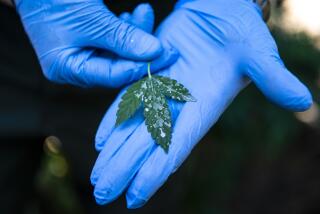Study Faults U.S. Pesticide Regulations
- Share via
WASHINGTON — A study released Sunday found serious scientific and regulatory deficiencies in the way the government assesses the health effects of pesticides on infants and children.
The National Academy of Sciences study concludes that far too little is known about how such chemicals affect the young and that there is “potential for concern” that some children may be ingesting unsafe amounts of pesticides.
It recommends that when adequate data on a given chemical are lacking, “there should be a presumption of greater toxicity to infants and children.” In such cases, the study called for exposure standards 10 times more stringent than normal.
The study emphasized that children’s consumption of fruits and vegetables should not be reduced.
“The current system for regulating pesticide residues for foods . . . needs to be fundamentally restructured so that health concerns become the priority,” said pediatrician Philip J. Landrigan, chairman of the study panel.
More to Read
Sign up for Essential California
The most important California stories and recommendations in your inbox every morning.
You may occasionally receive promotional content from the Los Angeles Times.








